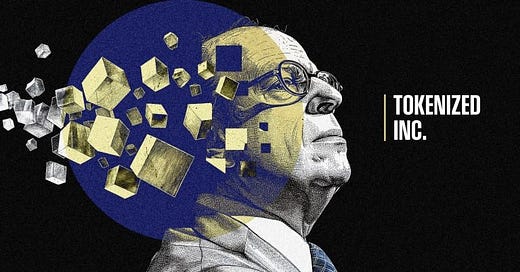Tokenized, Inc: BlackRock’s Plan To Own The Fractionalized World
In the aftermath of the recent Bitcoin ETF approvals, BlackRock’s Larry Fink revealed that soon everything will be “ETF’d” and tokenized
By Mark Goodwin And Whitney Webb
In the aftermath of the recent Bitcoin ETF approvals, BlackRock’s Larry Fink revealed that soon everything will be “ETF’d” and tokenized, threatening to fractionalize not just existing assets and commodities, but the natural world, reducing most living things into Wall Street financial products to be traded on a single, universal ledger.
Originally published at BitcoinMagazine.com
Just one day after the January 11 approval of 11 Bitcoin spot ETFs – including BlackRock’s iShares Bitcoin Trust (IBIT) – by the U.S. Securities and Exchange Commission, BlackRock Chair and CEO Larry Fink sat down with Bloomberg’s David Westin to discuss the implications of the world’s largest asset manager entering the Bitcoin market. Not one to mince words, Fink articulated a clear framework for his company’s approach to Bitcoin, and furthermore for BlackRock’s intention to replicate similar ETF products for other assets. “If we can ‘ETF’ a Bitcoin, imagine what we can do with all financial instruments.” Fink continued, speaking about Bitcoin itself, stating “I don’t believe it’s ever going to be a currency. I believe it’s an asset class.”
Bitcoin: Commodity, Not Currency
While the BlackRock Chair was not shy about expressing other aspects of the potential build of tokenized, digital markets, these two statements in particular illuminate the coveted path forward for how the biggest institutions intend to carefully integrate Bitcoin into the legacy financial system. Fink even went so far as to turn the abbreviated noun “ETF,” an exchange-traded fund, into a verb, gloating about transmuting the Bitcoin protocol into just another speculative commodity – all the efforts of miners and nodes across the world to decentralize trust in issuance and settlement reduced to a paper offering by their iShares division.
The biggest players in the United States dollar system are all but clamoring over each other to offer such products to their retail customers, understanding that this axiom neuters Bitcoin as a viable currency capable of competing with the day-to day bargaining and settlement utility of the dollar. There are many reasons to believe the US dollar system has much to gain from a dollar-denominated appreciation of bitcoin, but significantly less so if the protocol itself is capable of serving the everyday transactional needs of billions across the globe. One of the most common rebuttals to the claim that bitcoin cannot scale to become a functioning currency is the Lightning Network. While the trustless method of shared unspent transaction outputs (UTXOs) via hashed time locked contracts (HTLCs) payment channels is quite novel, the ultimate endgame for such a model servicing billions necessitates a large amount of liquidity (in bitcoin terms) locked up within the network. A centralized Lightning Network brings about many issues of privacy, transactional censorship, and even user access restrictions, not to mention the mathematical realities of demand for Bitcoin’s limited blockspace when opening a billion channels.
Many FinTech companies, such as Lightning Labs and Blockstream, have spent millions in capital developing methods for utilizing Bitcoin as a way to issue tokenized assets, such as stablecoins like Tether’s USDT, in order to transact dollar-denominated tokens via Lightning channels or federated sidechains. While the institutional adoption dreamed of by early Bitcoin adopters has certainly come to fruition, the actualization and methods of these institutions is clear: bitcoin must remain an asset, and all effort on scaling it as a currency should be directed towards the dollar. Fink himself in the same Bloomberg interview stated “We believe ETFs are a technology no different than Bitcoin was a technology for asset storage.” Bitcoin Spot ETF products encourage many practices far outside the norm of the typical Bitcoin user within the near decade and a half of its existence; e.g. trusting a custodian with your keys, limiting exchange to US business days and hours, and aggregating individual exposure into a collective paper claim managed and surveilled by highly-regulated brokers.
The anti-State revolution that has dominated most Bitcoin discourse since 2009 has become colored by red, white, and blue ticker tape. Furthering the idea that the US has much to gain from the adoption and co-option of Bitcoin is the tangible stash of coins distributed within its borders; MicroStrategy’s 189,150 bitcoin, the 215,000 bitcoin seized by the Department of Justice, Block.one’s 164,000, Grayscale’s 487,000 in GBTC, and now the new US spot ETF offerings hold a combined 170,174 bitcoin as of 1/31. This is inarguably a meaningful portion of the circulating supply of bitcoin, not to mention the likely possibility of further treasuries held off the books by American investors. Bitcoin is already making US ETF inflow history, as the combined growth within the first two weeks has already outpaced the decades-long entirety of the silver spot ETF market. Any liquidity needed for an institutional Lightning Network that could compete with legacy payment providers such as Visa or MasterCard is already safely nestled within the borders of the United States, and thus well-within reach of the regulatory arms of the DoJ, SEC, Treasury, and Federal Reserve.
Within the S-1 Registration Statement filing for the iShares’ Bitcoin Trust (IBIT) application is a clause that states:
“The Trustee will dissolve the Trust if…a U.S. federal or state court or regulator, or applicable law or regulatory requirements, requires the Trust to shut down, or forces the Trust to liquidate its bitcoin, or seizes, impounds or otherwise restricts access to Trust assets;”
While this may appear as simply due diligence for a securities offering, there is recent precedent of an iShares product being liquidated after pressure from the SEC due to geopolitical advancements, specifically the Russian invasion of Ukraine. In a press release from that same day, the iShares MSCI Russia ETF (ERUS) announced the suspension of “right of redemption of fund shares pursuant to an exemptive order issued by the [SEC]”, effective August 3, 2022, in order to “permit the fund to liquidate its portfolio.” Two weeks after the announcement, the press release stated that “BlackRock will begin liquidating ERUS by distributing its current liquid assets to shareholders,” after removing the estimated fees associated with the liquidation and transactions. Russian forces’ incursion into Ukraine triggered capital controls and sanctions from the consortium of related regulatory arms of the US government, which in turn restricted BlackRock – and all non-Russian investors – from participating in the Russian securities market. The final clause of the press release communicates that due to the unknown circumstances, “there can be no assurance that shareholders would receive any liquidating distribution relating to the Russian securities and depositary receipts after the initial distribution.”
Go paid at the $5 a month level, and we will send you both the PDF and e-Pub versions of “Government” - The Biggest Scam in History… Exposed! and a coupon code for 10% off anything in the Government-Scam.com/Store.
Go paid at the $50 a year level, and we will send you a free paperback edition of Etienne’s book “Government” - The Biggest Scam in History… Exposed! AND a 64GB Liberator flash drive if you live in the US. If you are international, we will give you a $10 credit towards shipping if you agree to pay the remainder.
Support us at the $250 Founding Member Level and get a signed high-resolution hardcover of “Government” + Liberator flash drive + Larken Rose’s The Most Dangerous Superstition + Art of Liberty Foundation Stickers delivered anywhere in the world. Our only option for signed copies besides catching Etienne @ an event.







Sheep herding in process. Herd all the sheep into ETF's. Claim there is another "financial crisis" and close all bank accounts. Steal all the money, ETF's, shares and pensions and voila. The Great Reset is complete. We will own nothing and be happy (or dead).
Considering the obvious transitional phase, as precisely explained by author and the USG and multinationals deep involvement, we as citizens could utilize the opportunity to exploit bitcoin's ability to act as a depository for such a financial shake down. Get familiar with the block chain ASAP.